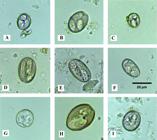Abstract
There is great diversity in swine coccidia, which are responsible for causing intestinal disorders ranging from sporadic diarrhea to severe cases of hemorrhagic enteritis. Thus, determining the species of coccidia that affect the animals of a region and associating them with the characteristics of the farms become extremely important. The objective of this study was to determine the prevalence of coccidia parasites in pigs reared in a family farming production system in the Semiarid Region of the State of Paraíba, Northeast Brazil. Fecal samples for analysis were collected from 187 pigs on 51 farms. For morphological analysis, 1,590 sporulated oocysts were used. The prevalence of oocysts in fecal samples was 56.6% (106/187). The most prevalent species were Eimeria suis (21.9%), followed by Eimeria neodebliecki (16.6%), Eimeria perminuta (14.9%), Eimeria polita (12.8%), Eimeria debliecki (10.6%), Eimeria porci (10.1%), Cystoisospora suis (3.7%), Eimeria scabra (1.6%) and Eimeria cerdonis (0.5%). It can be concluded that pigs from the Semiarid Region of the State of Paraíba were parasitized by a diversity of coccidia species, mainly of the genus Eimeria, and predominantly presented with mixed infections occurring in the subclinical form.
Keywords:
Cystoisospora; Eimeria; swine; family farming

 Thumbnail
Thumbnail
 Thumbnail
Thumbnail

